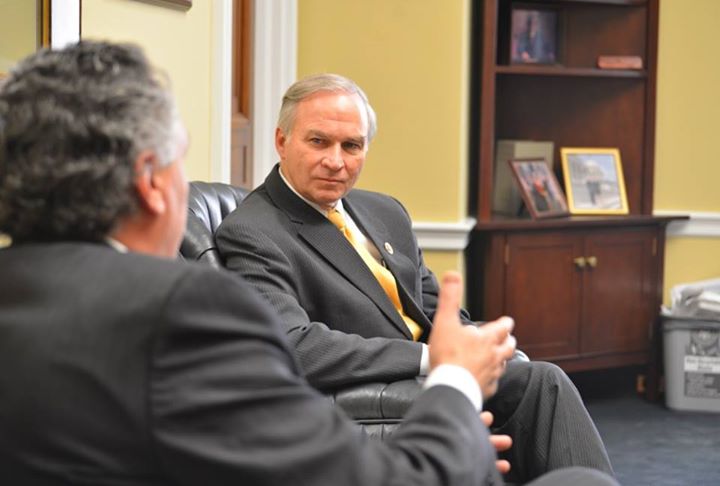
Rep. Randy Forbes
UPDATED Deal passed, Forbes voted “no” WASHINGTON: With hours to go before the House vote on the budget deal — assuming it doesn’t get derailed — the Republican caucus is deeply divided. A central selling point is the deal ups the defense budget, but one leading legislator on national security issues, House seapower subcommittee chairman Rep. Randy Forbes, told me yesterday evening he remained undecided.
“We are still going through it,” Forbes said. “I will tell you I have some major concerns.”
[UPDATE: Forbes ultimately voted against the deal, as did fellow HASC subcommittee chairman Rob Wittman (readiness). But the bill passed the House this afternoon by 266 votes to 167].
The chairman of the full House Armed Services Committee, Rep. Mac Thornberry, publicly endorsed the deal yesterday afternoon. So did HASC air-land chairman Rep. Mike Turner, who led 101 other House Republicans in a campaign against defense cuts. So far, however, the other four HASC subcommittee chairs remain silent: Joe Heck (personnel), Vicky Hartzler (oversight), Mike Rogers (strategic forces), and Joe Wilson (emerging threats).
“Most people [are] still just getting their arms around everything,” Rep. Forbes told me. Especially when the deal was first presented — in summary form — on Monday, he said, “a lot of people were a little numb, only because they had none of the details.”
In fact, one Hill staffer told me this morning, the concerns are sufficiently great they may force postponed of the vote, scheduled for this afternoon. “With all the Republicans opposing because of agriculture/hospital/Medicare stuff, it might end up getting pulled,” the staffer said in an email. “But for the moment, it’s scheduled to occur.”
What is Forbes most worried about? “It’s not just the dollars,” he told me. “There are some open ended provisions in this for the president that concern a lot of us,” most notably the debt limit: Instead of setting a new dollar figure, the deal simply allows continuing federal borrowing until 2017. Forbes has no confidence the White House won’t abuse that leeway: “This is not exactly an administration we trust to comply with the rule of law. When we give him restrictions he abuses them.”
In voicing these concerns, Forbes arguably speaks for a whole category of Republican who are deeply torn. Pro-defense moderates like Thornberry find it (relatively) easy to vote yes: The deal increases Pentagon funding, allows Congress to salvage the vetoed National Defense Authorization Act, and prevents a government shutdown or federal default. Conversely, hardcore Tea Party/Freedom Caucus types find it easy to vote no: They don’t think it’s worth dealing with the devil in the White House to avoid defense cuts, shutdown, or default, all of which they see as necessary evils or even positive goods.
But Forbes and many other Republicans want a strong defense as much as they distrust the Democrats. They have a few hours more to decide which matters more.
Connecticut lawmakers to grill Army, Lockheed about job cuts at Sikorsky helicopter unit
“The Connecticut delegation has questions about why, with that [FY24] appropriation in hand, this happened,” said Rep. Joe Courtney, D-Conn.


























